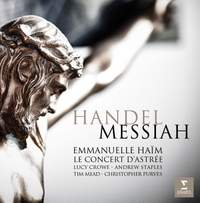Recording of the Week,
Emmanuelle Haïm conducts Handel's Messiah
With all the existing recordings of Messiah that already grace CD shelves around the world, the first question that must spring to mind for anyone committing another to disc must surely be to ask themselves how their version will stand out from the crowd. From Emmanuelle Haïm we now have a convincing and original answer: by referencing Handel's background in the theatre, playing up the dramatic aspects of a work that has sometimes seemed to be taken overtly seriously as an untouchable cultural monument.

Right from the beginning, it’s clear that Haïm has a liberal attitude towards ornamentation; the opening Sinfonia leading to a rendition of Ev’ry valley that borders on the florid! Tenor Andrew Staples’ voice is a light, nimble one, meaning that arias that are sometimes heroic clarion calls are here given a very different feel.
A number of her dramatic touches bear particular mention – the recitatives, in particular, being vehicles for much more expression than one might normally expect (as witness bass Christopher Purves’ changes of vocal timbre to match the shifting moods in Thus saith the Lord and Behold, I tell you a mystery, among others). The staccato treatment of the final, contemptuous chords of He trusted in God is another flourish that seems to come straight from the theatre or the opera house – and even the venerable Hallelujah Chorus receives a similar facelift, with the introduction of a cheeky echo effect at the beginning and plenty of dynamic contrasts throughout.
Haïm has also clearly put some thought into the larger-scale side of things. As well as these ear-catching little moments that brought a smile to my face, there are several choruses which she treats differently to the performances I’m used to. This is most noticeably the case with And with His stripes, whose angular subject is often taken as the cue for an aggressive and angry performance but which is here as smooth and lyrical as the “healing” of the words would suggest, and His yoke is easy, which benefits enormously from understated dynamics – seemingly reluctant to rise above mezzo-piano and giving a real sense of the lightness of the burden in a chorus that frequently feels laboured.
The soloists rise to Haïm’s challenge in fine style; all show great flexibility in adapting their voices to expressing a far wider range of emotions than Messiah is normally thought to involve. Soprano Lucy Crowe successfully makes I know that my Redeemer liveth sound new – no mean feat – and Christopher Purves’ prodigious range (shown off in his solo disc with Arcangelo a couple of years ago) takes him from a heroic top G to a Stygian pedal B in Why do the nations, only to ascend still further into tenor territory with an A in The trumpet shall sound!
Choir and orchestra are, of course, impeccable; the former’s diction is clear and their sound unfussy, and the latter’s instrumental colour refreshingly varied (in particular the timpani, whose sound is all the more cutting due to the use of period drumsticks with no padding). The addition of a double bass to the continuo helps to give weight to the recitative passages, again reinforcing their role as much more than merely narration between the main musical numbers – and indeed the recording benefits throughout from some pleasingly weighty doubling of the bass line at key moments.
This is definitely a Messiah worth listening to; lively and varied, it really is a new injection of life into an old favourite work and a recording that can stand shoulder-to-shoulder with any of the existing benchmarks.
Lucy Crowe (soprano), Andrew Staples (tenor), Tim Mead (counter-tenor), Christopher Purves (baritone), Le Concert d’Astrée Orchestre et Chœur, Emmanuelle Haïm
Available Formats: MP3, FLAC, Hi-Res FLAC



